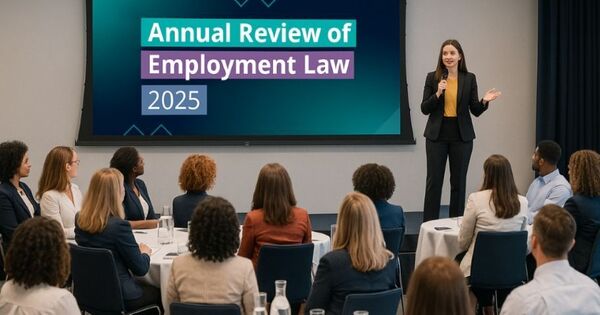Seamus McGranaghan qualified as a Solicitor in O'Reilly Stewart Solicitors in 2003 and is an experienced Commercial Lawyer dealing with employment, commercial and education cases.
He has experience in the Industrial Tribunal representing both Claimants and Respondents and has provided seminars in relation to particular areas of employment law. Seamus is the only member of the Education and Law Association in Northern Ireland. He specialises in advising schools and colleges on policy matters, employment issues and student welfare. He is also responsible for the Education Law Quarterly Review.
In addition to having contributed at Legal Island’s Education Updates since 2010, Seamus in association with Legal Island provides a live “Employment Law @ 11” webinar on the first Friday of each month, dealing with all aspects of Employment law affecting Northern Irish employers.
Each month, Legal Island’s popular ‘Employment Law at 11’ webinar with Seamus McGranaghan, Director from O’Reilly Stewart Solicitors, brings sharp legal insight on topical issues.
‘Seamus Says’ offers key takeaways so you can file them away for future reference (and avoid filing tribunal paperwork later!)
How can employers here in NI sustain DEI initiatives amid the global challenges?
I suppose for an HR person listening today, their MD calls them in and says, "What's all this Trump saying about it being a waste of money? How much money are we wasting on this stuff?" It's about trying to change the narrative. How much money are we saving not having to constantly recruit? How much money are we saving by getting the best candidate for the job instead of fishing in a small pool? Isn't that it, Seamus?
Yes, absolutely. Again, I suppose it goes back to the point that nothing has changed here. We are still required under the legislation to protect the rights of whatever protected characteristic that it is, or whatever the inclusivity aspect is.
The tribunal will look to see what your policies and procedures are. They will look to see how you implement your policies and procedures. Is it a tick box? Do we just have a policy that sits on our intranet or in a [inaudible 00:35:48] that's available, or is this a thriving document that the thread of it is woven throughout the organisation from the top down to the bottom?
If you look at the developments in the case law . . . And even if I think around the reasonable steps argument and those sorts of defences and all of the case law that we've talked about in our prior webinars, this certainly is not going away. I think that's the message. And you should still continue on in relation to your getting to the point where you're thriving rather than making headway, going back to those poll questions. I think most employers here understand that.
And I think that there can be a position where you're saying . . . And if we think back to the time of when the economy went downhill back in 2006, what was the first thing that the government did here? It was to remove some of the employment rights to try to spike the ability for employers to hire and to be able to fire if that wasn't working for them, and to give that increased flexibility around that.
I think that's what we're seeing really, ultimately, that is coming from America. It's an economic position where it is "wipe everything out and just blast on and push, push, push".
But I don't think from a societal position that that is . . . It might work for a while, but it's something that's going to ultimately fall flat on its face, and you're going to end up back in the place where you started from, I think, with the rights that are there.
So I think that it is important. It is not a singular issue in an organisation. It has to be something that is threaded throughout the organisation.
And if you look at any of the guidance that we receive and that we reviewed from the Equality Commission, from the Labour Relations Agency, top-to-bottom management training and open-door policy have to be a part of the organisation and not something that "if it happens, we huddle in a room and make a decision about how we're going to deal with it to wipe it under the carpet". That's not going to get you through a tribunal claim.
People are aware of their rights. There are certainly sufficient resources out there for employees and workers to understand their rights, and there are organisations there that will seek to safeguard and protect them as well. So if you end up in a tribunal, the clear message has to be, "This is what the expectation and the requirement will be, because that's what the law is here in Northern Ireland".
For more insights and extended discussions on employment law topics, tune in to our podcast.
Just search for "Employment Law at 11" on your favourite podcast platform — we're available on Spotify, Apple Podcasts, and Amazon Music.
Continue reading
We help hundreds of people like you understand how the latest changes in employment law impact your business.
Please log in to view the full article.
What you'll get:
- Help understand the ramifications of each important case from NI, GB and Europe
- Ensure your organisation's policies and procedures are fully compliant with NI law
- 24/7 access to all the content in the Legal Island Vault for research case law and HR issues
- Receive free preliminary advice on workplace issues from the employment team
Already a subscriber? Log in now or start a free trial



